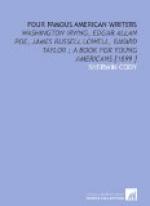“I went,” he says, “by way of the Isthmus of Panama—the route had just been opened—reached San Francisco in August, and spent five months in the midst of the rough, half-savage life of a new country. I lived almost entirely in the open air, sleeping on the ground with my saddle for a pillow, and sharing the hardships of the gold diggers, without taking part in their labors.”
On his return he gathered his letters into a volume entitled “Eldorado, or Adventures in the Path of Empire: comprising a voyage to California, via Panama; Life in San Francisco and Monterey; Pictures of the Gold Region, and Experiences of Mexican Travel.”
He now began to feel the strength and confidence of success; his brain was seething with new ideas, and he felt as if he could do that which would realize the destiny of which he had dreamed. But sorrow was already at his door. His hopes were for the time broken and thrown back by the death of Mary Agnew.
In the summer of 1851 he found himself worn out and depressed. His health was shattered and his mind was overpowered. But a change and rest were at hand. The editors of the Tribune suggested his going to Egypt and the Holy Land. In the autumn he set out, and spent the winter in ascending the Nile to Khartoum. He even went up the White Nile to the country of the Shillooks, a region then scarcely known to white men.
Bayard Taylor fancied that he had two natures, one a southern nature and one a northern nature. Of course the northern nature was his regular and ordinary one. In one of his later journeys, when he had entered Spain from France and was sitting down to a breakfast of red mullet and oranges fresh from the trees, “straightway,” he says, “I took off my northern nature as a garment, folded it and packed it neatly away in my knapsack, and took out in its stead the light, beribboned and bespangled southern nature, which I had not worn for eight or nine years.”
He donned this southern nature for the first time on his trip to California by way of Panama. Horace Greeley especially commended his letter from Panama. But it was during his journey in Egypt that he became most saturated with the south, and composed his “Poems of the Orient”—perhaps the best he ever wrote. He had not been in Alexandria a day and a half before he wrote to his mother that he had never known such a delicious climate. “The very air is a luxury to breathe,” he said. “I am going to don the red cap and sash,” he wrote from Cairo, “and sport a saber at my side. To-day I had my hair all cut within a quarter of an inch of the skin, and when I look in the glass I see a strange individual. Think of me as having no hair, a long beard, and a copper-colored face.” So much like a native did he become that when he entered the bank in Constantinople for his letters and money, they addressed him in Turkish.
He made the journey up the Nile on a boat with a wealthy German landowner, a Mr. Bufleb, who became to him like a brother, though he was nearly twice the age of Taylor. Some years later the young man married Mrs. Bufleb’s niece.




